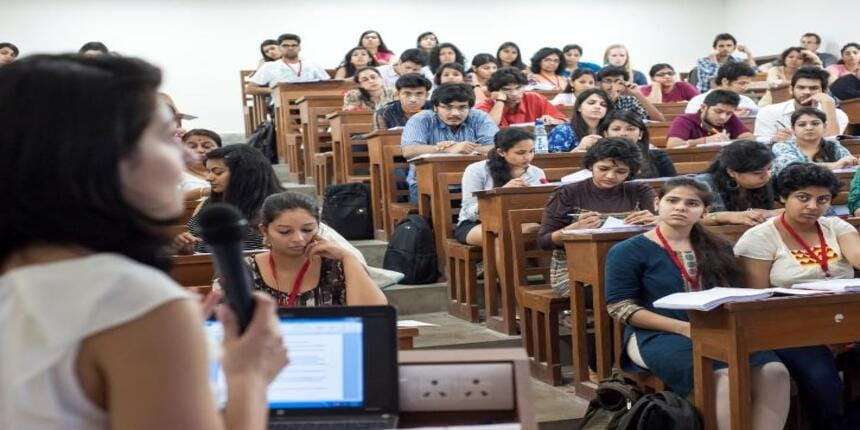MBA Education: Indian B-schools must set own gold standards for research, publications
Management: Madasu Bhaskara Rao explains why Indian B-schools need their own list of credible journals to ensure their research meets domestic needs.

Team Careers360 | November 18, 2021 | 01:06 PM IST
By Madasu Bhaskara Rao
Classification of journals by Australian Business Deans Council (ABDC) has gained traction over years for granting publication incentives among business schools, both public and private. ABDC ranks close to 2,700 journals into A*, A, B and C categories, with A* considered the gold standard for publications. ABDC revises journals in its coveted list from time to time after thorough scrutiny. It fosters the national and global impact of Australian business education and research.
Its mission is to make Australia's business schools better by being the collective and collegial voice of 39 member university business faculties and schools. The first list of journals was made public by ABDC in 2009. Since then, it has consistently created a credible list of journals.
Also Read | Management: Who is the online MBA degree for and how does it work?
B-schools in Indian context
Indian B-schools, aspiring to produce pioneering business research, have incentivized research publications with an objective to foster research culture. Incentives are granted by B-Schools for publications in ABDC classified journals, in addition to FT-45, SCOPUS and Web of Science among others.
The incentives vary across institutions. For instance, the incentive offered by Indian Institute of Management (IIM) Raipur and Rajagiri College of Social Sciences in Kochi is Rs 5 lakh for a ABDC A* publication; LIBA, Chennai, pays Rs 1.50 lakh; and International Institute of Management Studies, Pune offers an incentive of Rs 1 lakh plus 10 bonus points in their performance rating.
Also Read | How Indian lawyers, scientists gave Sci-Hub its first legal defence team
In the absence of credible peer-endorsed journal lists, many B-schools are turning to lists published by independent authorities such as ABDC or FT-45. However, there are issues with such independent, externally mandated lists. First, these lists are prepared by the respective agencies to meet their own goals or their country goals. Second, the lists are too aspirational and many Indian academics my find it difficult to successfully publish in them. Third, performance anxiety and the institutional pressure may push faculty to compromise on academic research and integrity. Finally, even if publications are in listed journals, such research may be of little relevance for the issues and problems faced by Indian industry result in the investment made in such research not giving desired return on investment.
MBA: Business education in India
B-schools contributed enormously in providing talented human resources for business and prospered along with economic growth. To realize GDP of USD 5 trillion, the Indian B-schools have to align themselves to the country’s vision and focus on making their teaching, training and research strategically aligned. Most Indian B-schools follow a US curriculum, pedagogy and interfacing with industry. The time has come for B-schools to focus on an India-centric curriculum, pedagogy and interfacing with industry that would promote Indian business and catapult India as global economic superpower.
Currently, India has more than 6,000 B-schools offering Masters in Business Administration (MBA). The time has come for these B-schools to identify the business needs, research the issues and find solutions that are socially relevant, economically viable and financially sustainable.
Also Read | How an Indian engineer became famous for his photographs of outer space
Management research and India’s growth story
The Indian economy is poised to grow at a faster pace than the world economy post-COVID-19. Achieving USD 5 trillion Indian GDP requires business educators partnering in the evolving growth story. To sustain this momentum, management institutions need to own the responsibility for producing India-centric research in areas concerning economy, markets, human resources, business operations, financial innovations and digitalization of business. Business educators must play their role aligned to country’s economic growth, employment and markets.
This warrants aligning academic research in areas of economics and business to that which impacts economy and society most. Hence journal lists that are externally relevant do not fit our strategic requirements.
Also Read | Institutions are now offering MBA in Hospital Management online
MBA Research: Way forward
The demand for talented human resources at all levels is bound to grow as the economy grows. Hence business educators have to get their act together and contribute to achieving the objectives and goals of the country by focusing their research appropriately.
Issues India faces in various spheres of business are far different from that of other developed countries. Business teaching and research should be relevant for the emerging needs of India. Although our talent development may cater to international corporations simultaneously, it should primarily be aimed at feeding the domestic business enterprises that spur economic growth, employability and sustainability. Using externally borrowed lists for promoting our research efforts is not only misaligned but also misplaced investment.
Also Read | Meet the AIIMS professor who also has a PhD from IIT Delhi
A country of India’s size, diversity and economic development has different challenges in pursuing its growth path. In a fast changing world of business where the competition is intensifying, managers have to understand the economic bottlenecks and institutional deficiencies; learn the political, legal and regulatory risks; get insights into the consumer markets and become mature, develop sophisticated and technologically savvy professionals. Hence our research should be India centric. Investments in research, including those of incentives, should address our needs.
It is time business management educators come up with a credible list of journals where the Indian researchers can publish high-quality research work and promote country-centric business strategies, policies and practices.
One of the criticisms against ABDC ranking system is its subjectivity. For instance, Human Resource Management (US) journal with an impact factor of 5.078 is ranked A*, while Human Resource Management Review with 7.444 and Human Resource Management Journal (UK) with 5.039 are ranked A. Economic and Political Weekly, known for its quality, published by Sameeksha Trust in India, is ranked B by ABDC. Journal of Services Marketing with an impact factor of 4.466 is rated A, while European Journal of Marketing with 4.647 is ranked A*. These examples are illustrative, not exhaustive.
Also Read | How do IITs set question papers for open-book exams?
The feedback and behaviour of Australian business academics influence the ABDC journal list. This makes ABDC classification less relevant for India. Hence, Indian business educators need to devise their own journal quality list that is relevant and serves Indian business and economic imperatives.
The top 100 business schools in the National Institutional Ranking Framework’s list (NIRF 2021) include several IIMs, Indian Institutes of Technology (IIT), private B-schools, government and private universities. Business educators with sterling research record, known for their national outlook and integrity should come together and constitute a Business Educators Council of India (BECI) and provide the much-needed direction and impetus for business management research and publications.
Also Read | NIRF Ranking 2021: Can't compare IITs, IISc with BHU, says BHU director
The ministry of education, University Grants Commission (UGC) and the All India Council for Technical Education (AICTE) may facilitate this process by constituting an apex body of business educators to nurture this initiative that can become gold standard for business and economics research in India. This may also cater to the needs of emerging economies.
The time for setting our own gold standards for business education, research and publications has arrived. Business educators should seize this opportunity and unleash their research prowess and contribute to global business for sustainability and prosperity.
Investments in incentives may be necessary to promote quality research. Aligning research to national and business priorities will make the return on investment worth that effort.
Madasu Bhaskara Rao is associate professor, ICFAI Business School, The ICFAI Foundation for Higher Education, Hyderabad.
Follow us for the latest education news on colleges and universities, admission, courses, exams, research, education policies, study abroad and more..
To get in touch, write to us at news@careers360.com.




